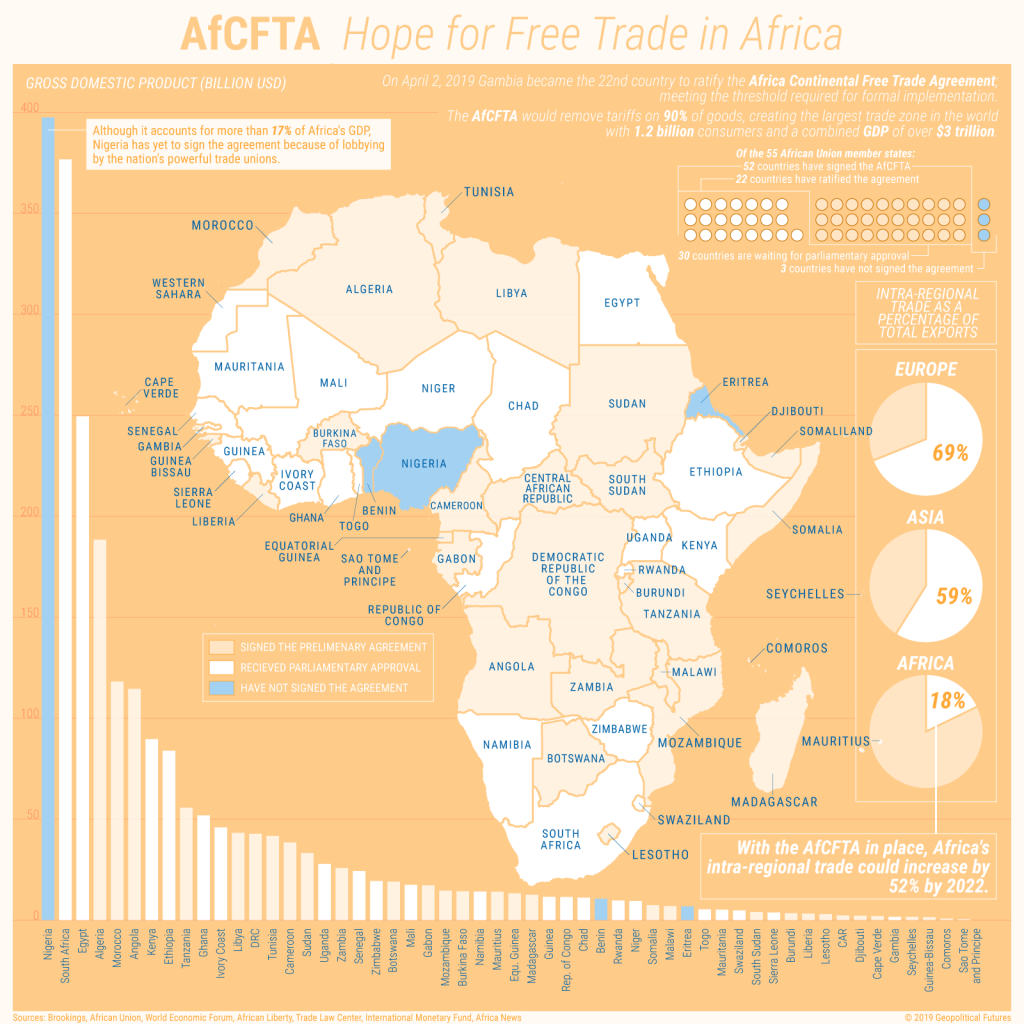A Transformative Accord for Trade and Development
The African Continental Free Trade Agreement (AfCFTA) heralds a new chapter in Africa’s economic history, marking the establishment of the largest free trade area in the world. With its genesis in the African Union, the AfCFTA has the potential to revolutionize trade and investment, unlocking economic opportunities and fostering sustainable development across the continent.

Image: geopoliticalfutures.com
This landmark agreement aims to create a single, integrated market for goods and services, covering a population of over 1.3 billion people and a combined GDP of over $3.4 trillion. By eliminating tariffs and reducing trade barriers, the AfCFTA seeks to facilitate the free flow of capital, goods, and labor, while promoting regional cooperation and economic growth.
Foundation Stones of the Agreement
The AfCFTA rests on several key pillars that govern its operation and ensure its effectiveness:
Tariffs and Non-Tariff Barriers: The agreement eliminates tariffs on 90% of goods traded within the AfCFTA region, with the remaining 10% to be phased out gradually. Additionally, it seeks to reduce non-tariff barriers, such as excessive regulations and technical standards, that have hindered trade in the past.
Rules of Origin: The AfCFTA establishes clear rules of origin, determining the eligibility of goods for preferential treatment under the agreement. These rules specify the minimum amount of value-added that must occur within the region for a product to qualify as originating from Africa.
Trade in Services: The agreement covers not only trade in goods but also services, including telecommunications, financial services, and tourism. It aims to liberalize the services sector, facilitating the movement of skilled workers and the provision of services across borders.
Dispute Resolution: The AfCFTA establishes an independent dispute settlement mechanism, providing a means for resolving disputes between member states or businesses. This mechanism ensures fairness, transparency, and predictability in the resolution of trade disputes.
Benefits for African Economies
The AfCFTA offers a multitude of benefits for African economies, including:
Increased Trade: By eliminating tariffs and reducing barriers, the AfCFTA is expected to significantly increase intra-African trade. This will boost economic activity, create jobs, and promote economic specialization within the region.
Improved Competitiveness: The agreement encourages regional value chains and economies of scale, enhancing the competitiveness of African businesses in global markets. It also promotes the transfer of technology and skills, fostering innovation and productivity.
Industrialization and Diversification: The AfCFTA provides incentives for industrialization and economic diversification by creating a larger and more reliable market for African-made goods and services. This will reduce dependence on primary commodities and foster the growth of new industries.
Job Creation and Poverty Reduction: The increased trade and economic growth generated by the AfCFTA are expected to create significant job opportunities and improve livelihoods across the continent. By reducing poverty and inequality, the agreement can contribute to social stability and sustainable development.
Challenges and the Way Forward
While the potential benefits of the AfCFTA are immense, several challenges must be addressed to ensure its successful implementation:
Implementation and Capacity Building: Effective implementation of the AfCFTA requires strong institutional capacity and robust infrastructure in participating countries. This includes establishing efficient customs systems, developing trade-related infrastructure, and building the necessary regulatory frameworks.
Informal Trade: A significant portion of trade in Africa remains informal, posing a challenge to the implementation and enforcement of the AfCFTA. Addressing informal trade requires addressing its underlying causes, such as lack of access to formal trading channels and high formalization costs.
Infrastructure Deficiencies: Africa faces significant infrastructure challenges, including limited transport networks, unreliable energy supply, and communication gaps. Addressing these deficiencies is crucial for facilitating efficient trade and investment under the AfCFTA.
Overcoming Non-Tariff Barriers: While the AfCFTA eliminates tariffs, non-tariff barriers, such as technical regulations, standards, and administrative procedures, can still hinder trade. Harmonizing regulations and standards is essential to ensure seamless movement of goods and services.

Image: oal.law
What Is Africa Free Trade Agreement
The Future of African Economic Integration
The AfCFTA is a bold and visionary agreement that has the potential to transform the economic landscape of Africa. By promoting trade, investment, and regional cooperation, the agreement can accelerate economic growth, create jobs, and improve living standards across the continent.
The successful implementation of the AfCFTA requires the collective efforts of governments, businesses, and civil society organizations. Through collaboration, innovation, and a shared commitment to economic integration, Africa can unlock the full potential of the AfCFTA and embark on a path of sustainable and inclusive growth.
The AfCFTA is a testament to the aspirations of Africa for unity and prosperity. It represents a historic opportunity for the continent to take control of its economic destiny and build a brighter future for its people.






